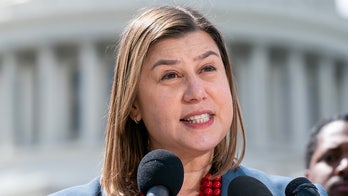
FILE: January 29, 2013: Ana Castro, a union member, chants after President Obama's speech on immigration, inside La Plaza United Methodist Church in Los Angeles, Calif. (REUTERS)
An estimated hundreds of thousands of illegal immigrants married to U.S. citizens will soon have an opportunity to become legal residents without having to serve a years-long punishment.
President Obama proposed the policy change in January 2012 and it is scheduled to go into effect March 4.
The change was proposed to end situations in which illegal-immigrant spouses (and often parents) have to return to their native countries to serve the “ban of admission” – as long as 10 years for staying illegally in the United States for more than a year.
Applicants must show that leaving the U.S. for an extended period would create “extreme hardship” on their legal spouse, like having to cope with a major illness or caring for a special-needs child.
Under the process, applicants would still have to first prove to the federal government that they are in a legitimate marriage. Then they can apply for the waiver without leaving the U.S.
If the waiver is approved, the applicants can return to their native country to go through a green-card interview process, then return to the U.S. to wait for weeks – not years – for the waiver approval. Once the waiver is approved, they can apply to the State Department for a visa.
The 10-year punishment is part of law passed by Congress in 1996 to discourage illegal immigration.
The president made the policy changes ahead of his second-term effort to pass comprehensive illegal-immigration reform.
On Tuesday, he detailed a plan that would provide a path to citizenship that also includes improved border security, an overhaul of the legal immigration system and helping businesses verify the legal status of workers.
Obama made the announcement one day before a bipartisan group of senators proposed a similar plan, except that it ties citizenship more directly to border security.
The president last year also issued a directive that suspends deportation for many young illegal immigrants brought to the U.S. as children by their parents.
Though the president has suggested his policy changes are to reduce hardships on families with illegal immigrants, his waiver and other directives have drawn some criticism.
“It’s allowing people to avoid this penalty,” Jessica Vaughan, director of policy studies for the Washington-based Center for Immigration Studies, told The Arizona Republic.




